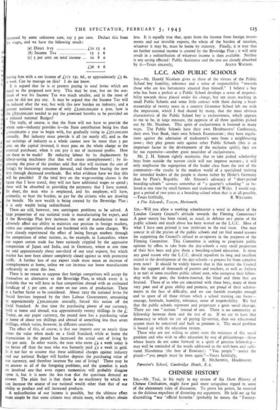L.C.C. AND PUBLIC SCHOOLS SIR,-Mr. Harold Nicolson gives as three
of the virtues of the Public School boy humility, tolerance and a sense of responsibility " towards those who are less fortunately situated than himself." I believe a boy who has been a prefect at a Public School develops a sense of responsi- bility towards those placed under his charge, but ten years teaching in small Public Schools and some little contact with them during a head- mastership of twenty years in a country Grammar School left me with the impression, which I find shared by many, that the most obvious characteristic of the Public School boy is exclusiveness, which appears to me to be, in large measure, the opposite of all three qualities picked out by Mr. Nicolson. This spirit of exclusiveness is fostered in many ways. The Public Schools have their own Headmasters' Conference, their own Year Book, their own Schools Examination ; they have regula- tions against the admission of tradesmen's sons from a neighbouring town ; they play games only against other Public Schools (this is an important factor in the development of the exclusive spirit); they are far too expensive—another great nourisher of exclusiveness.
Mr. J. H. Simson rightly maintains that to take picked scholarship boys from outside the narrow circle will not improve matters ; it will only emphasise the segregation of the leader class from the rest of the community—the results in the modern world of a specialised training for intended leaders of the people is shown rather by Hitler's Germany than by Plato's Republic. Mr. Simson's advocacy of " short-period boarding-schools " savours somewhat of " a quarter's schooling " so be- loved at one time by small farmers and tradesmen of Wales. I would sug- gest a period of two years at a boarding-school when that is at all possible.
—Yours faithfully, R. WILLIAMS. 2 Plas Edwards, Towyn, Merioneth.


























 Previous page
Previous page